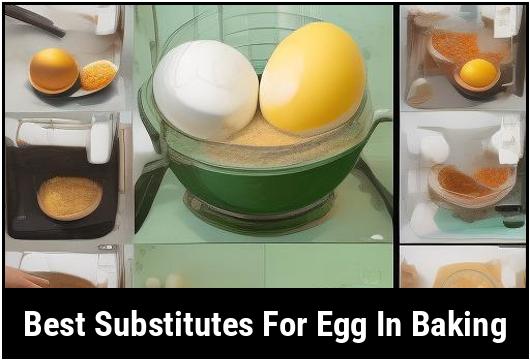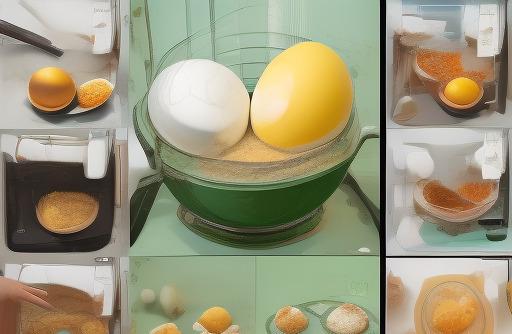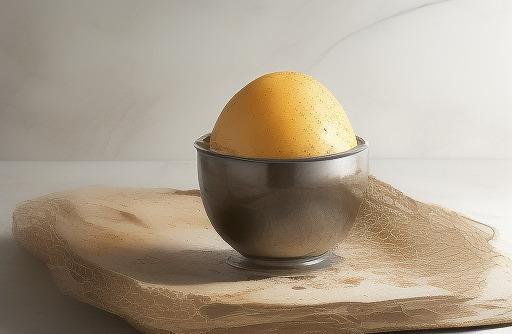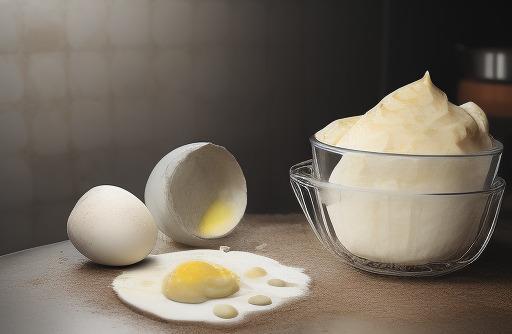- You are here:
- Home »
- Food Substitutes
- » Best Substitutes For Egg In Baking
Best Substitutes For Egg In Baking

Eggs are a common ingredient in baking recipes, adding moisture, structure, and richness to the finished product. However, if you are following a vegan diet, have an egg allergy, or simply don’t have eggs on hand, you’ll need alternatives to achieve the same results in your baked goods. Fortunately, there are several excellent substitutes for eggs that can be used in baking, allowing you to create delicious treats without compromising on taste and texture.
Key Takeaways
- Eggs are commonly added to baking recipes for moisture, structure, and richness.
- Veganism, egg allergies, and egg scarcity are some reasons for using egg substitutes.
- Popular substitutes for eggs in baking include applesauce, bananas, yogurt, silken tofu, and flaxseed meal.
- The type of substitute you choose depends on the specific recipe and desired outcome.
- Substitutes may alter the taste and texture of the final product, but with experimentation and adjustments, delicious results can still be achieved.
- It’s important to consider storage and shelf life when using egg substitutes.
Why You Need A Substitute For Egg In Baking
There are various reasons why you might need a substitute for eggs in your baking. Here are a few common scenarios:
-
Vegan or Plant-Based Diet: If you follow a vegan lifestyle or choose to avoid animal products, using egg substitutes in your baking allows you to create delicious treats that align with your dietary choices.
-
Egg Allergy or Sensitivity: Some individuals have allergies or sensitivities to eggs, which can cause adverse reactions. Using egg alternatives ensures that everyone can enjoy your baked goods without any health concerns.
-
Egg Scarcity or Unavailability: Occasionally, you may find yourself without eggs due to unforeseen circumstances or limited availability. In such cases, having knowledge of effective egg substitutes can save the day and allow you to continue baking.
Types Of Substitutes For Egg In Baking

When substituting eggs in baking, it’s essential to understand the role eggs play in the recipe. Eggs contribute to moisture, structure, leavening, and binding. Based on these characteristics, various ingredients can be used as substitutes for eggs. Here are some popular options:
-
Applesauce: Unsweetened applesauce works well as an egg substitute, particularly in recipes that call for only one or two eggs. Use 1/4 cup of applesauce for each egg in the recipe. The applesauce provides moisture and helps bind the ingredients together.
-
Bananas: Mashed ripe bananas are another great option to replace eggs in baking. They add moisture and contribute to the binding properties of eggs. Use 1/4 cup of mashed bananas for each egg in your recipe. The flavor of bananas may be noticeable in the final product, so it’s best suited for recipes where the taste pairs well with bananas, such as banana bread or muffins.
-
Yogurt: Plain yogurt or Greek yogurt can be used as an egg substitute to provide moisture and creaminess. Use 1/4 cup of yogurt for each egg in the recipe. Yogurt works well in recipes that require a tender texture, such as cakes and muffins.
-
Silken Tofu: Silken tofu is a popular choice for creating a custard-like texture in baked goods. It provides moisture and acts as a binding agent. Use 1/4 cup of pureed silken tofu for each egg in your recipe. It works best in recipes that don’t require a fluffy texture, such as brownies or cookies.
-
Flaxseed Meal: Flaxseed meal mixed with water creates a gel-like substance that mimics the binding and leavening properties of eggs. To replace one egg, mix 1 tablespoon of ground flaxseed meal with 3 tablespoons of water. Allow the mixture to sit for a few minutes until it thickens. Flaxseed meal works well in recipes like pancakes, waffles, and muffins.
-
Aquafaba: Aquafaba is the liquid left over from cooked chickpeas or the reserved liquid from canned chickpeas. It can be whipped into stiff peaks and used as an egg white substitute for recipes that require meringues or pavlovas. The ratio for substituting aquafaba is three tablespoons for one whole egg.
These are just a few examples of egg substitutes commonly found in baking recipes. Each substitute brings its own unique properties to the recipe, and it’s important to choose the right one based on the desired outcome and the specific characteristics required for the recipe.
Best Substitutes For Egg In Baking
While there are many alternatives to eggs in baking, the best substitute depends on the specific recipe and the desired results. Here are some of the best substitutes for eggs in baking:
-
For Moisture and Binding: Applesauce, mashed bananas, and yogurt are excellent choices when you need moisture and binding properties. These substitutes work well in cakes, muffins, and quick breads, providing the necessary structure and texture.
-
For Fluffiness and Lightness: Aquafaba and silken tofu are great substitutes when you want to achieve a light and airy texture in your baked goods. Aquafaba can create a fluffy consistency in recipes that call for whipped egg whites, while silken tofu can provide a moist and tender crumb.
-
For Leavening: If you’re looking for a substitute that can leaven your baked goods, consider using a combination of baking powder and vinegar. Mix 1 teaspoon of baking powder with 1 tablespoon of vinegar for each egg in your recipe. This combination is especially effective in recipes that require a rise, such as cakes and cupcakes.
-
For Binding and Nutty Flavor: Flaxseed meal works well as a substitute for both moisture and binding properties. It also adds a nutty flavor to your baked goods. This substitute is ideal for recipes like pancakes, waffles, and cookies.
Remember that each substitute may alter the taste and texture of the final product, so it’s important to adjust the recipe accordingly and experiment to achieve the desired results. Keep in mind that the amount and type of substitute you choose may vary depending on the recipe, so it’s always a good idea to do a test run before making a large batch.
Pro Tip: When using a vegan egg substitute like flaxseed meal or aquafaba, make sure to thoroughly whisk or blend the ingredients to ensure proper incorporation and prevent any raw taste in the final baked goods.
Choosing The Right Substitute For Egg In Baking

Selecting the right egg substitute for your baking recipe depends on several factors. Consider the following when choosing a substitute:
-
Recipe Type: Different recipes require different characteristics from eggs. For example, cakes and muffins need moisture, while cookies and brownies require binding. Choose a substitute that best matches the desired outcome of your recipe.
-
Allergies and Preferences: Consider any allergies or dietary restrictions that may influence your choice of an egg substitute. For example, if you’re allergic to nuts, using almond meal or nut butter as a substitute may not be suitable.
-
Flavor Compatibility: Some egg substitutes, such as bananas or applesauce, have distinct flavors that can impact the overall taste of your baked goods. Make sure the substitute you choose complements the other ingredients in the recipe.
-
Texture and Structure: Eggs contribute to the texture and structure of baked goods. Consider whether you want your final product to be light and fluffy or dense and moist, and choose a substitute accordingly.
-
Availability and Convenience: Some substitutes may be readily available in your pantry, while others may require a trip to the store. Consider the convenience of the substitute and the availability of the ingredients when making your choice.
By considering these factors, you can select the most appropriate egg substitute for your baking needs and ensure the best results in your finished product.
Cooking With Substitutes For Egg In Baking
When baking with egg substitutes, it’s important to keep in mind that the final product may have slight differences in taste, texture, and appearance compared to the original recipe. However, by making a few adjustments and using the right techniques, you can still achieve delicious results. Here are some tips for cooking with substitutes for egg in baking:
-
Measure Accurately: Ensure that you measure the egg substitute accurately based on the recipe’s instructions. Using the exact amount will help maintain the right balance of ingredients and achieve the desired results.
-
Adjust Other Ingredients: Depending on the substitute used, you may need to make adjustments to other ingredients in the recipe. For example, if you’re using a sweetened applesauce substitute, you might need to reduce the amount of sugar in the recipe to balance the sweetness.
-
Whisk or Blend Thoroughly: To avoid any clumps or an unpleasant texture in your baked goods, make sure to whisk or blend the substitute ingredients thoroughly. This ensures proper incorporation and a consistent texture throughout the mixture.
-
Add Leavening Agents: If your recipe calls for whipped egg whites or relies on eggs for leavening, you may need to add additional leavening agents, such as baking powder or baking soda, to achieve the desired rise and texture.
-
Increase Baking Time: Some egg substitutes may require a longer baking time compared to recipes that use eggs. Keep an eye on your baked goods and monitor the cooking process to ensure they are fully cooked and have the desired consistency.
Remember, experimenting and adjusting recipes is part of the fun when using egg substitutes. With practice, you’ll find the perfect balance and achieve delicious results in your baked goods.
Recipes Using Substitutes For Egg In Baking

Now that you’re familiar with various substitutes for eggs in baking, here are a couple of recipes to try:
Vegan Chocolate Chip Cookies
Ingredients:
- 1/2 cup vegan butter, softened
- 1/2 cup brown sugar
- 1/4 cup white sugar
- 1/4 cup unsweetened applesauce
- 1 teaspoon vanilla extract
- 1 3/4 cups all-purpose flour
- 1/2 teaspoon baking soda
- 1/2 teaspoon salt
- 1 cup vegan chocolate chips
Instructions:
- Preheat your oven to 350°F (175°C) and line a baking sheet with parchment paper.
- In a large mixing bowl, cream together the softened vegan butter, brown sugar, and white sugar until well combined.
- Add the unsweetened applesauce and vanilla extract to the bowl and mix until incorporated.
- In a separate bowl, whisk together the all-purpose flour, baking soda, and salt.
- Gradually add the dry ingredients to the wet ingredients, mixing until a dough forms.
- Fold in the vegan chocolate chips until evenly distributed throughout the dough.
- Drop spoonfuls of dough onto the prepared baking sheet, spacing them about 2 inches apart.
- Bake for 10-12 minutes, or until the edges are golden brown.
- Allow the cookies to cool on the baking sheet for a few minutes before transferring them to a wire rack to cool completely.
- Enjoy your delicious vegan chocolate chip cookies!
Vegan Banana Bread
Ingredients:
- 3 ripe bananas, mashed
- 1/2 cup vegan butter, melted
- 1/4 cup unsweetened applesauce
- 1 teaspoon vanilla extract
- 1/2 cup white sugar
- 1/2 cup brown sugar
- 2 cups all-purpose flour
- 1 teaspoon baking soda
- 1/4 teaspoon salt
- 1/2 teaspoon ground cinnamon
- 1/4 teaspoon ground nutmeg
- 1/2 cup chopped walnuts (optional)
Instructions:
- Preheat your oven to 350°F (175°C) and grease a 9×5-inch loaf pan.
- In a large mixing bowl, combine the mashed bananas, melted vegan butter, unsweetened applesauce, and vanilla extract.
- Add the white sugar and brown sugar to the bowl and mix until well combined.
- In a separate bowl, whisk together the all-purpose flour, baking soda, salt, ground cinnamon, and ground nutmeg.
- Gradually add the dry ingredients to the wet ingredients, mixing until just combined. Do not overmix.
- Fold in the chopped walnuts if desired.
- Pour the batter into the prepared loaf pan and smooth the top with a spatula.
- Bake for 50-60 minutes, or until a toothpick inserted into the center comes out clean.
- Allow the banana bread to cool in the pan for 10 minutes, then transfer it to a wire rack to cool completely before slicing.
- Enjoy a slice of delicious vegan banana bread!
Storage And Shelf Life Of Substitutes
It’s important to consider storage and shelf life when using egg substitutes in baking. Here are some guidelines for storing common egg substitutes:
- Applesauce: Store in an airtight container in the refrigerator for up to 7 days.
- Mashed Bananas: Store in an airtight container in the refrigerator for up to 3 days.
- Yogurt: Check the package for specific storage instructions, but typically store in the refrigerator for up to 1-2 weeks.
- Silken Tofu: Store unopened in a cool, dry place. Once opened, transfer any remaining tofu to an airtight container and store in the refrigerator for up to 4-5 days.
- Flaxseed Meal: Store in an airtight container in the refrigerator for up to 1 month.
- Aquafaba: Store in an airtight container in the refrigerator for up to 7 days.
It’s important to note that the shelf life of these substitutes may vary based on the specific brand and storage conditions. Always check for any signs of spoilage before using.
Conclusion
Whether you’re following a vegan lifestyle, have an egg allergy, or simply don’t have eggs on hand, knowing the best substitutes for eggs in baking is incredibly useful. By using ingredients like applesauce, bananas, yogurt, silken tofu, flaxseed meal, or aquafaba, you can create delicious baked goods without compromising on taste and texture. Experiment with different substitutes to find the perfect balance for your recipes, and remember to adjust other ingredients and cooking techniques as needed. With a little practice and creativity, you’ll be able to enjoy a wide range of baked treats, completely egg-free!
FAQS
What Are Some Substitutes For Eggs In Baking?
There are several substitutes that can be used in place of eggs in baking, including mashed bananas, applesauce, silken tofu, aquafaba, and commercial egg replacers.
Can Mashed Bananas Replace Eggs In Baking?
Yes, mashed bananas can be used as a substitute for eggs in baking. Use 1/4 cup of mashed bananas for each egg in a recipe.
What Is Aquafaba And How Can It Be Used As An Egg Substitute?
Aquafaba is the liquid from canned chickpeas, and it can be used as an egg substitute in baking and cooking. It can be whipped like egg whites to make meringues and can be used to thicken sauces and custards.
Can Silken Tofu Be Used As An Egg Substitute In Baking?
Yes, silken tofu can be used as an egg substitute in baking. Use 1/4 cup of pureed silken tofu for each egg in a recipe.
Are Commercial Egg Replacers A Good Substitute For Eggs In Baking?
Yes, commercial egg replacers can be a good substitute for eggs in baking. They are formulated specifically for baking and can often be used in multiple recipes. Be sure to read the package instructions for the recommended amounts and application.
Sources
About the Author Jenny
I'm Jenny, a housewife with an unwavering passion for food. My culinary journey began with my grandmother's kitchen, and it's now a full-fledged food blog. I've turned my love for cooking into a creative outlet, sharing recipes and stories with a global community of fellow food enthusiasts. It's proof that being a housewife can also mean pursuing your passions and savoring life's delectable moments.
